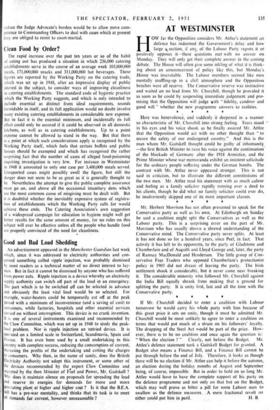AT WESTMINSTER
HOW far the Opposition considersr. Nr. Attlee's statement on defence has redeemed the Government's delay and how large %section, if any, of the Labour Party regrets it or positively opposes it—these questions met with no answer on Monday. They will only get their complete answer in the coming debate. The House will often give some inkling of what it is think- ing about an announcement of policy like this, but Monday's House was inscrutable. The Labour members seemed like men mentally muffling-up in a chill atmosphere and the Opposition benches were all reserve. The Conservative reserve was instinctive and waited on no lead from Mr. Churchill, though he provided it as soon as he could by suspending immediate judgement and pro- mising that the Opposition will judge with " fidelity, candour and good will " whether the new programme answers to realities.
* . * * *
Here was benevolence, and suddenly it deepened in a manner so characteristic of Mr. Churchill into strong feeling. Tears stood in his eyes and his voice shook as he finally assured Mr. Attlee that the Opposition would act with no other thought than " to secure the safety of our endangered country." And this is the man whom Mr. Gaitskell thought could be guilty of inhumanity,
—the first British Minister to raise his voice against the continuation of the blockade of. Germany after the 1918 Armistice, and the Prime Minister whose war memoranda exhibit an insistent solicitude for the ordinary people suffering under the German bombs. The contrast with Mr. Attlee never appeared stronger. This is not said in criticism, but to illustrate the different constitutions of the two men. Mr. Attlee read his statement with as much colour and feeling as a family solicitor rapidly running over a deed to his clients, though he did what no family solicitor could ever do, he inadvertently skipped one of its most important clauses. * * * * Mr. Herbert Morrison has not often presumed to speak for the Conservative party as well as his own. At Edinburgh on Sunday he said a coalition might split the Conservatives as well as the Labour party. This is a surprising error on the part of Mr. Morrison who has usually shown a shrewd understanding of the Conservative mind. The Conservative party never splits. At least it has not done so for a hundred years, since Peel, in fact. That activity it has left to its opponents, to the party of Gladstone and Chamberlain and of Asquith and Lloyd George and, later, the party of Ramsay MacDonald and Henderson. The little group of Con- servative Free Traders who opposed Chamberlain's protectionist policy in 1903 did not dream of leaving the party. The Irish settlement shook it considerably, but it never came near breaking it. The considerable minority who followed Mr. Churchill against the India Bill equally shrank from making that a ground for splitting the party. It is unity first, last and all the time with the Conservative party.
* * * * If Mr. Churchill decided to enter a coalition with Labour tomorrow he would carry his whole party with him because of this great price it sets on unity, though it must be admitted Mr. Churchill would be most unlikely to agree to enter a coalition on terms that would put much of a strain on his followers' loyalty. The dropping of the Steel Act would be part of the price. How- ever, there is to be no coalition and once again the question is: " When the election ? " Clearly, not before the Budget. Mr. Attlee's defence statement took a Gaitskell Budget for granted. A Budget also means a Finance Bill, and a Finance Bill cannot be put through before the end of July. Therefore, it looks as though there will be no election if Mr. Attlee can help it before the autumn, an election during the holiday months of August and September being, of course, impossible. But in order to hold on so long Mr. Attlee would have to have the complete support of his party on the defence programme and not only on that but on the Budget, which may well prove as bitter a pill for some Labour men to swallow as the defence measures. A mere fractional revolt on


































 Previous page
Previous page